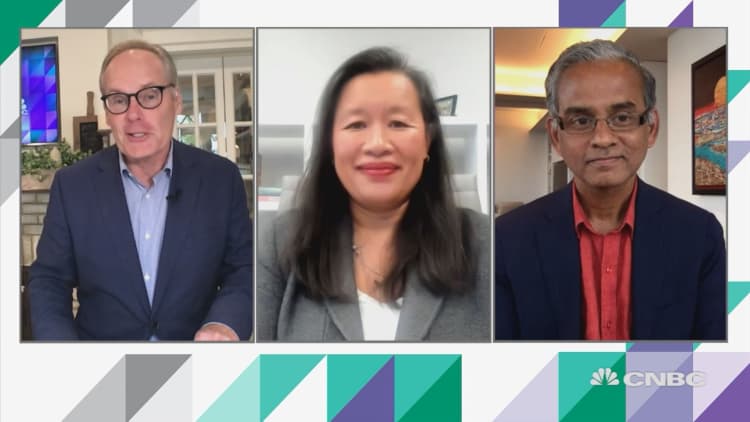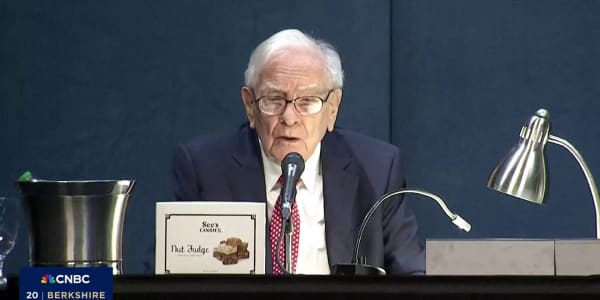
It's obvious by now that the coronavirus pandemic has resulted in a pace of change in the professional workplace previously unimaginable, and led by technology. It is going to get faster.
Digital transformation of work has been taking place for years, but the past 100 days has made it clear that what might have been a five-year journey will be compressed into a period of one year, says Tiger Tyagarajan, president and CEO of consulting firm Genpact.
"People are saying we can get there faster in exponential ways. We've always wanted to do these things, and we can," said Tyagarajan at a CNBC virtual @Work Spotlight on Thursday. "We're living the future faster than we expected."
"We had to tear up our plans on Jan. 1 and completely rebuild the plan in two weeks," said Que Dallara, president and CEO of Honeywell Connected Enterprise. "We built two factories producing N95 masks in five weeks, which would normally take nine months," said Dallara, who also took part in the CNBC virtual event.
Cloud technology is among the drivers allowing change to occur faster and creating new value, but before Covid-19, there was still a general resistance among business leaders to change too much, too fast — a fear of taking risks. Not anymore, according to Tyagarajan. "It has forced us to leapfrog all that," he said.
Here are some of the biggest, permanent changes the Genpact and Honeywell executives expect, from measuring the mood of remote workers on a daily basis to factory-floor safety protocols being put in place everywhere.
1. Divide between knowledge workers and everyone else
We've already seen the acceleration in software innovation for office jobs, and that will ultimately need to go to front-line workers and operations workers like those that Honeywell employs in the industrial sector, said Dallara. "That's where we live," she said, but added that cloud technology and artificial intelligence are tools that today do not immediately and widely lend themselves to those job roles, based on cost and effectiveness, among other reasons.
"In the operational world, there is a physical barrier. How do we run a factory remotely and keep workers safe? Theses are all new questions we are grappling with now," Dallara said.
Dallara said the idea now standard in the office world of a worker "remoting in" every day is coming to factories. Suppliers and frontline workers already can remotely access certain machines and equipment all over the world and keep machines running. "It's amazing to see," she said.
2. The old way of forecasting is out
The global coronavirus pandemic has made supply and demand in many industries much more volatile, and old forecasting methods are not working. But forecasting won't go back to a previous approach ever again, Tyagarajan said.
"It won't work. The world will continue to be uncertain," he said. "Technology allows real-time analytics to be used by a highly distributed democratized workforce."
He said in Genpact's work with consumer goods and retail companies during the Covid-19 outbreak, there were some surprising demand spikes, like for wheat flour and yeast, which "went through the roof." Meanwhile, the decline in the sale of candy, which consumers sometimes spontaneously pick up in a store meant supply chains had to quickly adjust. Cloud-based collection of data and presentation of data analytics will lead to decisions that can be made faster and on a more collaborative level.
3. Women just won back five years of work life
Talent is being looked at in a new way, with the ability to access talent in different locations, and talent that does not need to come to an office every day. That is going to be more significant with knowledge workers than, say, in manufacturing, but even knowledge workers have not done enough remote work until now, Tyagarajan said, and the shift will lead to greater gains in workforce diversity.
Using gender as an example, he said that Genpact has already begun to see a hiring pipeline of more women that the company has always wanted to access but who have not been applying for jobs due to issues like commutes during a period of life when they have young children.
"We've been very open, but not as open as we could have been, and clients less open," he said of remote work and diverse hiring. "This will open real opportunities to access talent in the U.S., Europe, Asia, all over the world — talent that would have said, 'We will take another five years off."
4. Manufacturing safety applied everywhere
As Honeywell sales professionals head back out to customers for in-person meetings, the company is putting together safety kits for them as they travel and take flights. Honeywell has a lot to learn about safety protocols from its industrial roots.
"It occurred to me safety has always been an area of the industrial world," Dalarra said. "We can't open a factory without that, but now it is happening in the office arena where the pressing issue had been ergonomics. Now, while you don't need a hardhat, how do you even check into an office?"
To give employees the confidence to come back to work, safety innovation needs to moving from the industrial world to the office world. Changes likely to take place including increasing need for UV sterilization, and higher standards of ventilation and air purification, whether it is an office, Starbucks, McDonalds or hotel.
"Things that would be unimaginable previously, but now are a requirement for all of us to return to work," the Honeywell executive. "In manufacturing, we have been nonstop working since the pandemic materialized, so that has not stopped, and figuring out how to make it work will vary in different sectors."
5. Chatbot mood measurement
The massive move to remote work has leaders across enterprises thinking about, and worrying about, the mood and morale of employees, Tyagarajan said.
"It is very important in a distributed workforce, understanding mood and engagement. We can't just walk across and understand by having a conversation at the desk," he said,
Genpact had begun an experiment about a year ago with a chatbot going out to its 95,000 employes across the globe and asking them questions and giving "mood scores."
In the Covid-19 world, Genpact realized that it needed to send that chatbot out every 24 hours. Now each day the chatbot is measuring the mood of employees, and clusters of employees. This does not mean it interacts with every employee every day. It follows up with particular employees and groups of employees were initial responses to questions were flagged by the AI.
"The machine says, 'yesterday we did not get a great answer, not getting hep from their manager, feeling claustrophobic. It picks that up and says we should go back again to that person," the Genpact CEO said. "Maybe it is a cluster in Romania of 4,000 workers that doesn't have a good score, feels depressed."
"It is better than just humans doing it. It is a game-changer for Covid-19 and post, it will last," Tyagarajan said.
Genpact also has launch more 800-numbers and counselors for employee support, "much more than before," he said.
6. As much as 50% less business travel, even for CEOs
Dallara said even as airline traffic bounces back, business travel will remains down from the next one to two years, though it is hard to tell by exactly how much. "No one knows the new normal," she said.
The Genpact CEO said as a consulting firm, his business has always relied on travel to client companies, but he expects it will come down by 50% "forever."
"It has nothing to do with Covid, though," Tyagarajan said. "Now that we have experienced a world where we can be much more productive with lesser travel, and clients saying the same thing, we will travel 50% less. "
The Genpact CEO travel 150 days a year and said that will change for him as well. He said client relationships are being made deeper through virtual connections, rather than having big gaps between meetings that was more typical in a travel-oriented world. Ultimately, this is leading to a sea change in decision making.
"Big decisions that used to take six months or 9 months now we are able to get it down to weeks," he said. "If all of us move to decision making much faster, the world will be better place."
For more on tech, transformation and the future of work, join the most influential voices disrupting the next decade of work at the next CNBC @Work Summit this October.






